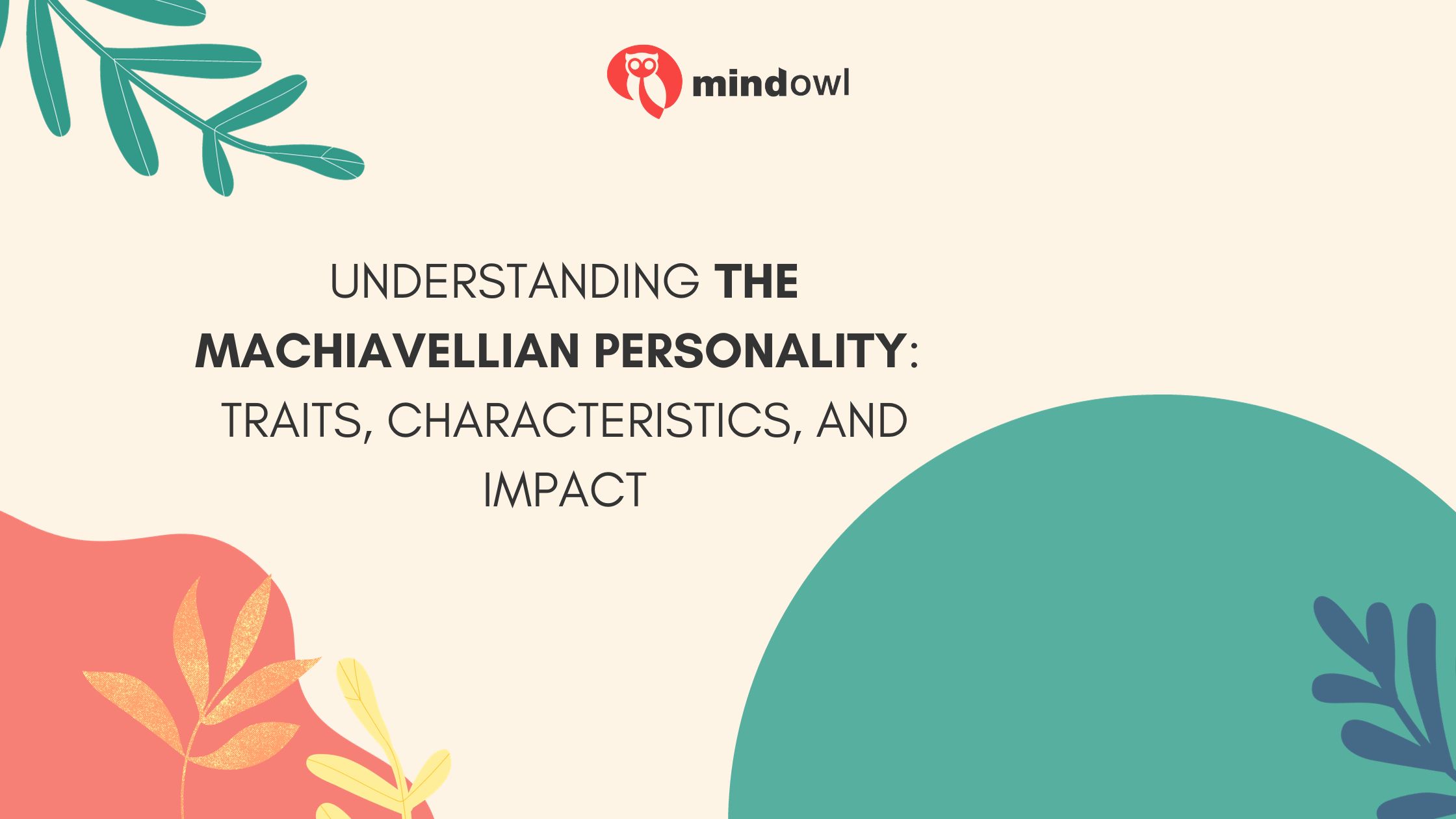
Navigating the complexities of human personalities can offer insights into why people act as they do, particularly when their actions seem cold and calculated. The term ‘Machiavellian’ comes from Renaissance thinker Niccolò Machiavelli, whose name has become synonymous with cunning deception in pursuit of power.
In this post, we’ll uncover the traits of a Machiavellian personality and how it affects relationships and workplaces, equipping you with knowledge to handle such tricky dynamics. Stay tuned for an intriguing exploration that may well shed light on the enigma wrapped in a riddle—the Machiavellian character.
Key Takeaways
- Machiavellianism is a personality trait where people use trickery and don’t care about right or wrong when they want power.
- Kids can learn to be Machiavellian from their families or what happens around them. It’s not just grown-ups who can act this way.
- Being friends or working with someone who has Machiavellian traits can be hard, but setting clear boundaries helps a lot.
- The Mach – IV test tells how much of these tricky traits a person might have. A higher score means more traits.
- Some people think we should not label folks as \”Machiavellian.\” There is much talk about if it’s the right way to understand people.
What is Machiavellianism?

Machiavellianism is a personality trait characterised by cunning, manipulation, and a cynical view of others. It draws inspiration from Niccolò Machiavelli’s book “The Prince” and is measured using the Machiavellian Personality Scale (MPS).
This trait is also closely related to other personality traits such as psychopathy and narcissism.
Origin and inspiration from Niccolò Machiavelli
Niccolò Machiavelli was a man who knew a lot about power and self-interest. He lived in Italy many years ago, wrote books, and thought deeply about politics and people. Machiavelli believed that humans always want more, especially power.
His ideas came from watching leaders and seeing how they got what they wanted.
People say the term “Machiavellianism” comes from him because he showed how some rulers were very sneaky to stay in charge. They would trick others and not care about right or wrong if it meant winning power.
This is why today, when someone is called Machiavellian, it means they use clever tricks to control situations for their own gain without worrying much about morals or other people’s feelings.
Core features and the Machiavellian Personality Scale (MPS)
Machiavellianism is all about being sneaky and clever in a way that’s not always good. People with this trait often want power and will trick others to get it. They might not care much about right or wrong if it means they win.
The Machiavellian Personality Scale (MPS) helps figure out how much of this trait someone has. It uses questions from research to measure just how Machiavellian a person is.
Psychologists Richard Christie and Florence Geis came up with the MPS after studying what makes people act in such sly ways. This scale can show who could be good at leading because, sometimes, these folks do well as bosses or in jobs where they have to make tough choices without getting too emotional about them.
But remember, having Machiavellian traits doesn’t always mean someone will use them for bad stuff – it just means they have the skills that could be used that way if they choose to.
Relationship with other personality traits
Machiavellian traits often show up alongside other personality features, especially those found in what experts call the Dark Triad. This trio includes narcissism and psychopathy, along with Machiavellianism.
People high in these traits tend to focus on themselves a lot, have a strong desire for power, and often don’t care about others’ feelings.
People with a Machiavellian personality may share some habits with those who have antisocial personality disorder. They might not follow social rules or might lie and trick people without feeling sorry.
Both types find it easy to manipulate others to get what they want. But remember, not everyone with Machiavellian traits has a personality disorder.
Causes and Development of Machiavellianism

Machiavellianism is believed to have both genetic and environmental factors contributing to its development, with some individuals showing early signs of manipulative behavior in childhood.
Studies have also linked Machiavellianism to the Dark Triad traits of psychopathy and narcissism, suggesting a complex interplay between these personality characteristics.
Genetic and environmental factors
People don’t just wake up one day with a Machiavellian personality. It often grows from both their genes and things that happen to them. These two forces work together like teammates, shaping who they become.
For example, some folks might be born with certain traits that make it easier for them to manipulate others or care less about people’s feelings. But it’s not all in the DNA – what happens as they grow up matters too.
Let’s say a child watches adults use sneaky tactics to get what they want. That kid might learn these tricks and think it’s okay to act the same way. Or maybe someone has tough times that teach them trust is risky, pushing them toward using deceit as a safety net.
Both home life and events can nudge someone down the path of developing Machiavellian traits alongside any natural tendencies they have from their family tree.
Machiavellianism in children
Kids can pick up Machiavellian ways just like adults. They might not fully understand right from wrong yet, but they learn how to use tricks to get what they want. Sometimes this happens because of the way they are raised or the things they see around them.
Kids with these traits often don’t think about others’ feelings and might seem cold in the way they act.
Some children show signs of Machiavellianism early on. This doesn’t mean watching for other people’s reactions; it’s more about learning sneaky ways to influence friends and family.
Sadly, these kids may feel sad or alone a lot, just like grown-ups who act in Machiavellian ways do. It’s important to figure out why some kids act this way so we can help them grow up without hurting their future relationships.
Next, let’s delve into the specific traits spotted in someone with a strong Machiavellian streak.
Relation to the Dark Triad (psychopathy, narcissism)
Machiavellianism is part of the Dark Triad, along with narcissism and psychopathy. These traits often mix together in people. They can be mean and hurt others to get what they want.
Folks with these traits might not feel bad about it either. Machiavellian people are good at controlling others and they like power a lot.
They may act a bit like narcissists who love being the center of attention or psychopaths who don’t care much for rules or feelings. These three personality types can make it hard for someone to have good friendships or work well with others.
Understanding this link helps us see why some folks act in sneaky or selfish ways at times.
Traits and Characteristics of a Machiavellian Personality
Individuals with a Machiavellian personality exhibit traits such as obsession with personal power and manipulation, lack of empathy and shallow emotions, inconsistent success in manipulation, and a tendency to prioritise thinking over doing.
To understand the impact of these traits on personal and professional relationships, it’s important to delve deeper into their behavioural patterns and motivations. Learn more about the influence of Machiavellianism by exploring its complexities within the context of interpersonal dynamics.
Obsession with personal power and manipulation
People with Machiavellian personality traits have a strong focus on gaining personal power. They will do almost anything to get ahead, including lying and tricking others. This might involve telling someone what they want to hear or pretending to be their friend while secretly working against them.
Their main aim is always to control situations and people for their own benefit.
Machiavellian types enjoy being in charge and often think about ways to bend others’ actions to suit their needs. They are skilled at figuring out how people work and using this knowledge to influence them.
Although they may seem successful, their tactics can damage trust and respect in relationships, both at home and at work.
Lack of empathy and shallow emotions
Individuals with Machiavellian traits display a void of empathy and exhibit shallow emotions, which can impact their personal and professional relationships. Their interactions lack genuine concern for the well-being of others, leading to emotionally detached connections.
This dearth of empathy enables them to manipulate situations without regard for the feelings or suffering they may cause, aligning with their pursuit of personal power and control.
These characteristics underscore the complex nature of Machiavellian personalities in navigating social dynamics.
Inconsistent success in manipulation
Machiavellian personalities often seek to manipulate others for their gain. However, they may not always achieve consistent success in their manipulative endeavours. This inconsistency in manipulation can be influenced by various traits and characteristics inherent in Machiavellian personalities, such as their ability to adapt to different situations and the level of cunning or persuasion they possess.
The success of manipulation associated with Machiavellian traits can vary widely based on individual differences and specific circumstances.
While some individuals high in Machiavellianism may experience occasional wins in manipulating others, there are instances where their efforts may not yield the desired outcomes. Factors such as the resilience and perceptiveness of their targets, as well as external factors beyond their control, can contribute to the inconsistent results that Machiavellian personalities encounter in manipulating others.
It’s important to recognise that the effectiveness of manipulation by those with Machiavellian traits is not absolute but rather contingent on a complex interplay of personality dynamics.
Thinking vs. doing
Machiavellian personalities tend to prioritise action over contemplation. They focus on achieving their goals through practical and often manipulative means rather than getting lost in deep thoughts or moral considerations.
This emphasis on action can lead them to use others as tools for their own advancement, showing little concern for the ethical implications of their actions. Machiavellians are more inclined towards taking calculated risks and seizing opportunities without hesitation, reflecting their proactive approach to pursuing personal power and control.
The contrast between thinking and doing is a key aspect of Machiavellianism, with individuals exhibiting a clear preference for decisive action over introspective rumination. Their inclination towards manipulation and strategic behaviour reflects an emphasis on immediate results rather than dwelling on hypothetical scenarios or moral dilemmas, underscoring the pragmatic nature of Machiavellian personalities in navigating interpersonal relationships and achieving their objectives.
Impact of Machiavellianism in Personal and Professional Relationships
Machiavellianism can have a detrimental impact on both personal and professional relationships. Individuals with Machiavellian traits may manipulate, deceive, and exploit others to achieve their goals, leading to instability and mistrust in close relationships or workplace dynamics.
Recognising signs of Machiavellian behaviour is crucial for managing and mitigating its impact on interpersonal interactions.
Coping with a Machiavellian personality
Dealing with someone with a Machiavellian personality can be challenging. Setting clear boundaries is important when interacting with individuals high in Machiavellian traits. They may use manipulation to achieve their goals, so being assertive and standing firm on personal limits is crucial.
Additionally, seeking support from mental health professionals or counsellors can provide guidance on managing relationships with Machiavellian personalities.
Understanding the impact of Machiavellianism in personal and professional relationships helps in navigating interactions with individuals who exhibit these traits, ensuring healthier communication and relationship dynamics.
Recognising signs of manipulative behaviour and prioritising emotional well-being are vital aspects of coping effectively with a Machiavellian personality.
Signs of a Machiavellian partner or colleague
A Machiavellian partner or colleague tends to manipulate others for their own benefit. They may use charm and manipulation to gain power and control, often at the expense of others’ well-being.
You might notice a lack of genuine empathy, shallow emotions, and a tendency to prioritise personal gain over ethical conduct in your interactions with them. Pay attention to inconsistent behaviour patterns and a strong desire for dominance in relationships or workplace dynamics as potential indicators of Machiavellian traits among partners or colleagues.
How to Deal with a Machiavellian Personality
When dealing with a Machiavellian personality, it’s essential to set clear boundaries and avoid being manipulated. It’s also important to understand their tactics and maintain a sense of self-awareness in interactions with them.
Tips for managing a relationship with a Machiavellian person
Set clear boundaries when dealing with a Machiavellian person. Stick to your values and don’t let them manipulate or control you. Keep interactions brief and focused, avoiding unnecessary personal information sharing.
Be cautious of trusting a Machiavellian person too quickly, as they may have hidden motives. Take time to observe their behaviour and actions before fully engaging in any type of relationship with them.
It’s important to remember that managing a relationship with a Machiavellian person can be challenging due to their manipulative tendencies and lack of empathy. Stay aware of their tactics and prioritise self-care to protect your well-being while interacting with them.
Possible test results on the Mach-IV test
Individuals who take the Mach-IV test may receive a score indicating their level of Machiavellian traits, with higher scores suggesting a greater presence of these traits. The test consists of twenty questions and uses self-reporting to assess Machiavellianism.
Notably, most people might exhibit some degree of Machiavellian traits based on the test results, highlighting the prevalence of this personality characteristic in society. Christie and Geis developed this inventory as a tool for evaluating an individual’s inclination towards Machiavellian behaviors, providing insights into their psychological makeup and predisposition.
Understanding possible test results on the Mach-IV scale can offer valuable insights into an individual’s personality characteristics and how they may navigate personal and professional relationships based on their levels of Machiavellianism.
Conclusion
In conclusion, understanding Machiavellian personality traits and characteristics is crucial in navigating personal and professional relationships. Machiavellians’ manipulative nature and emotional detachment can pose challenges, but awareness of these traits empowers individuals to set boundaries and manage these relationships effectively.
Despite the controversy surrounding this personality trait, acknowledging its impact can lead to more informed interactions with those exhibiting Machiavellian tendencies. By recognising the signs and employing appropriate coping strategies, individuals can mitigate the negative effects of Machiavellianism while fostering healthier connections in various contexts.
This could be added as a subheading under the “Causes and Development of Machiavellianism” section.
The controversy surrounding Machiavellianism as a measurable personality trait has sparked debates in the field of psychology. Some question its validity, while others argue for its significance based on empirical evidence.
Studies have shown correlations between Machiavellian traits and various negative outcomes, such as reduced relationship quality and increased likelihood of engaging in manipulative behaviors.
Proponents believe that understanding these traits is crucial for identifying individuals at risk of causing harm to others or themselves.
Critics point out that measuring Machiavellianism solely through self-report questionnaires may not accurately capture the complexity of this personality construct. They argue that external assessments and diverse research methodologies should be employed to validate the concept more robustly.
Moreover, there are ethical considerations in labeling individuals as “Machiavellian” without comprehensive understanding and preventive measures in place. This ongoing debate underscores the need for continued rigorous research into the nature and implications of Machiavellianism.
FAQs
1. What is Machiavellianism in personality traits?
Machiavellianism is a personality trait marked by manipulation and emotional coolness. It’s one of three dark triad traits, including narcissism and psychopathy.
2. How does someone with Machiavellianism view relationships?
Someone with high levels of Machiavellianism may see relationships as tools to gain what they want, often preferring emotionally detached interactions.
3. Can you measure how Machiavellian a person is?
Yes, psychologists use the Machiavellianism scale from personality inventories to assess where an individual falls on this trait.
4. Are people who score high in Machiavellianism good at understanding others’ emotions?
No, studies suggest people high in this trait lack emotional intelligence and may not form healthy relationships easily.
5. Is there a link between Machiavellian personalities and other negative traits?
Indeed, research finds that those with a higher tendency for Machiavellian behaviors also show signs of narcissistic personality disorder and psychopathy.
6. Where did the term ‘Machiavellian’ come from originally?
The term comes from Niccolò Machiavelli who wrote “The Prince,” which some think suggests using crafty strategies necessary to achieve goals—like those seen in such personalities.
MindOwl Founder – My own struggles in life have led me to this path of understanding the human condition. I graduated with a bachelor’s degree in philosophy before completing a master’s degree in psychology at Regent’s University London. I then completed a postgraduate diploma in philosophical counselling before being trained in ACT (Acceptance and commitment therapy).
I’ve spent the last eight years studying the encounter of meditative practices with modern psychology.

